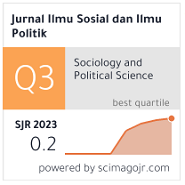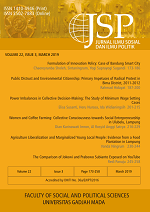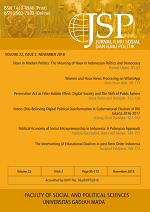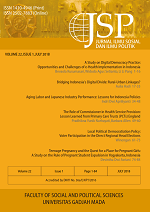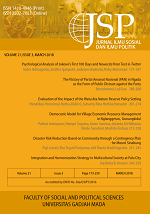Fiscal Decentralization and Corruption: The Facts of Regional Autonomy Policies in Indonesia
Ahmad Syarif(1*)
(1) Department of Islamic Economics and Business, UIN Sultan Aji Muhammad Idris Samarinda, Indonesia
(*) Corresponding Author
Abstract
Decentralization has posed new problems in Indonesian local governments, including disparities between regions, poor public services, fiscal indiscipline, and corruption cases. Before the implementation of regional autonomy, corruption cases were reported only in a few regions. A year after decentralization started, in 2002, more corruption cases were reported in more regions nationwide. The irony is that such decentralization, initiated to reduce corruption in the government, ended up with more corruption in the regions. This study investigates the relationship between fiscal decentralization—as proxied by capital expenditure and fiscal independence index—and the corruption index. This study also analyzes the macro factors and regional characteristics: inflation, civil servants’ salaries, education levels, and the differences in the corruption index at the regional level. The method used in this study is regression analysis by using panel data from longitudinal studies involving 15 cities in Indonesia in 2008, 2010, 2015, and 2017. The finding shows that the relationship of fiscal decentralization—expenditure, inflation rates, civil servants’ salaries, and local corruption—are not statistically significant to the corruption index. By contrast, the relationship between the fiscal independence index and educational level are statistically significant. The implementation of fiscal decentralization on expenditure increases corruption risks due to ineffective budget management, individual corrupt tendencies, and weak supervision system. Meanwhile, fair allocation of local income can increase public trust and prosperity and lower corruption risks.
Keywords
Full Text:
PDFReferences
Akai, N., & Sakata, M . (2002). Fiscal decentralization contributes to economic growth: evidence from state-level cross- section data for the United States. Journal of Urban Economics, 52(1), 93–108.
Alfada, A. (2019). Does fiscal decentralization encourage corruption in local governments? Evidence from Indonesia. Journal of Risk and Financial Management, 12(3), 118.
Anti Corruption Commission, (2018), Annual Report KPK,
Arends, H. (2020). The dangers of fiscal decentralization and public service delivery: a review of arguments. Politische Vierteljahresschrift, 1–24.
Arikan, G. G. (2004). Fiscal decentralization: A remedy for corruption?. International Tax and Public Finance, 11(2), 175–195.
Baltagi, B. H., & Baltagi, B. H. (2008). Econometric analysis of panel data. Springer.
Batzilis, D. (2019). Electoral competition and corruption: Evidence from municipality audits in Greece. International Review of Law and Economics, 59, 13–20.
Boikos, S. (2016). Corruption, public expenditure and human capital accumulation. Review of Economic Analysis, 8(1), 17–45.
Cheasty, A., & Pichihua, J. (2015). Fiscal decentralization: Progress and challenges for the future. Dentro de:“PERU: Staying the Course of Economic Success”, International Monetary Fund, 151–170.
Chen, C., Liu, C., & Lee, J. (2020). Corruption and the quality of transportation infrastructure: evidence from the US states. International Review of Administrative Sciences.
Das, K. C., & Mahalik, M. K. (2020). International subsidiary performance of Indian multinationals in the extractive sector: The role of institutional quality, corruption and investment regime. Resources Policy 67, 101664.
Denly, M., & Gautam, A. (2021). Poverty, Party Alignment, and Reducing Corruption through Modernization: Evidence from Guatemala.
Dong, B., Zhang, Y., & Song, H. (2019). Corruption as a natural resource curse: Evidence from the Chinese coal mining. China Economic Review, 57, 101314.
Financial Audit Board. (2019). Report on Fiscal Independence of Local Government year 2018-2019. Retrieved from https://www,bpk,go,id/assets/files/lkpp/2019/ lkpp_2019_1594713274,pdf
Fisman, R., & Gatti, R. (2002). Decentralization and corruption: evidence across countries, Journal of Public Economics, 83(3), 325–345.
Foltz, J. D., & Opoku‐Agyemang, K. A.(2015). Do higher salaries lower petty corruption? A policy experiment on West Africa’s highways, Unpublished Working Paper, University of Wisconsin-Madison and University of California, Berkeley, 12, 245.
Ghosh, S., & Gregoriou, A, (2008), The Composition of Government Spending and Growth: The Role of Corruption, Citeseer.
Greene, W. H. (2000). Econometric Analysis, Prentice Hall International, Inc, New York,
Hsiao, C. (2022). Analysis of panel data, Cambridge University Press.
Herzfeld, M. (2015). Heritage and corruption: the two faces of the nation-state. International Journal of Heritage Studies, 21(6), 531–544.
Indonesia Corruption Watch, (2011). 11 Anggota DPRD Kota Madiun Divonis Penjara.
Indonesia Corruption Watch, (2016). Tren penindakan kasus korupsi 2004-2006.
Jimenez, A., Puche-Regaliza, J. C., Jiménez-Eguizábal, J. A., & Alon, I. (2017). Political discretion and corruption: the impact of institutional quality on formal and informal entrepreneurship, European Journal of International Management, 11(3), 280–300.
Johnston, M. (2017). Measuring the new corruption rankings: Implications for analysis and reform, In Political corruption (pp. 865–884), Routledge.
Kotera, G., Okada, K., & Samreth, S. (2012). Government size, democracy, and corruption: An empirical investigation. Economic Modelling, 29(6), 2340–2348.
Lakshmi, G., Saha, S., & Bhattarai, K. (2021). Do Strong Institutions really Combat the Bitterness of Corruption? A Study of BRIC Stock Returns.
Lin, B., & Zhou, Y. (2021). Does fiscal decentralization improve energy and environmental performance? New perspective on vertical fiscal imbalance. Applied Energy, 302, 117495.
Liu, L. Ding, D., & He, J. (2019). Fiscal decentralization, economic growth, and haze pollution decoupling effects: a simple model and evidence from China. Computational Economics, 54(4), 1423–1441.
Maguchu, P. S. (2018). The law is just the law: analysing the definition of corruption in Zimbabwe, Journal of Financial Crime.
Nam, T. (2018). Examining the anti-corruption effect of e‐government and the moderating effect of national culture: A cross‐country study. Government Information Quarterly, 35(2), 273–282.
Oto‐Peralías, D., Romero‐Ávila, D., & Usabiaga, C. (2013). Does fiscal decentralization mitigate the adverse effects of corruption on public deficits?. European Journal of Political Economy, 32, 205–231.
Pradhan, P. M. (2012). Understanding the relationship between Human Development Index (HDI) and Corruption Perception Index (CPI) For Nepal. Unpublished Thesis of MPPG, North-South University, Bangladesh.
Ratnawati. (n.d). Government Spending, Road Quality, and Corruption. Jakarta.
Regional Autonomy Implementation Monitoring Committee. (2016). Fiscal Optimalization for Regional Economic Growth, Jakarta.
Sassi, S., & Gasmi, A.(2017). The Dynamic Relationship Between Corruption— Inflation: Evidence from Panel Vector Autoregression. The Japanese Economic Review, 68(4), 458–469.
Shon, J., & Cho, Y. K. (2020). Fiscal decentralization and government corruption: Evidence from US states. Public Integrity, 22(2), 187–204.
Smith, B. (2008). Edmund Burke, the Warren Hastings trial, and the moral dimension of corruption. Polity, 40(1). 70–94.
Udeagha, M. C., & Ngepah, N. (2022). Dynamic ARDL simulations effects of fiscal decentralization, green technological innovation, trade openness, and institutional quality on environmental sustainability: evidence from South Africa. Sustainability, 14(16), 10268.
Ulman, S.‐R., & Bujancă, G. V. (2014). The corruption influence on the macroeconomic environment, Empirical analysis on countries development stages. Procedia Economics and Finance, 16, 427–437.
Villalonga, J. R. (2018). Fiscal centralization: a remedy for corruption?. SERIEs, 9(4), 457–474.
Wellalage, N. H., Locke, S., & Samujh, H. (2019). Corruption, gender and credit constraints: Evidence from South Asian SMEs.Journal of Business Ethics, 159(1), 267–280.
Wu, S., Li, B., Nie, Q., & Chen, C. (2017). Government expenditure, corruption and total factor productivity. Journal of Cleaner Production, 168, 279–289.
Yagboyaju, D. A. (2017). Religion, culture and political corruption in Nigeria, Africa’s. Public Service Delivery and Performance Review, 5(1), 1–10.
Zhang, C. M. (2019). Sovereign Wealth Funds for Sustainable Economic Development in Sub-Saharan Africa. Stern School of Business New York.
Article Metrics
Refbacks
- There are currently no refbacks.
Copyright (c) 2023 Jurnal Ilmu Sosial dan Ilmu Politik

This work is licensed under a Creative Commons Attribution-ShareAlike 4.0 International License.







